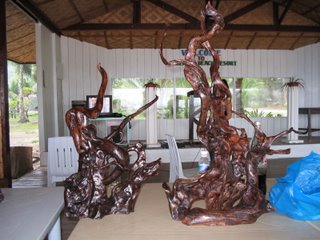 One of the things that Lianga is well known for is furniture and decorative items made of a local species of Philippine hardwood known as Magkono. The tree from where this durable, dark-colored and extremely dense wood comes from apparently grows only in the dense forests of the surrounding area and rarely anywhere else.
One of the things that Lianga is well known for is furniture and decorative items made of a local species of Philippine hardwood known as Magkono. The tree from where this durable, dark-colored and extremely dense wood comes from apparently grows only in the dense forests of the surrounding area and rarely anywhere else.Magkono wood is so hard that it is also called "ironwood" and cutting down a mature tree even by modern methods is still a time consuming and laborious process. When I was a child, I once witnessed a man trying to cut down a bridge post of Magkono wood with an ax and I could still remember the sparks that flew everytime the ax head made contact and the speed with which its cutting edge became blunted after only a couple of blows.
Furniture made from it can last for generations and is impervious to termites and other wood-boring insects. If skillfully made and elegantly designed, such furniture items are heirloom pieces and can fetch really hefty prices in the furniture market.
The scarcity in the supply of Magkono lumber, however, and the banning of any commercial cutting of Magkono trees have made it difficult for furniture makers to supply the huge demand for Magkono furniture pieces and going around the government ban can be an expensive, risky and dangerous business if you consider the harsh legal penalties you might incur if caught red-handed by the law.
The supply for smaller decorative pieces and knicknacks made from the same wood is more readily available if you know where to look for them. Coffee tables with stools, table ornaments, fruit bowls and trays, and the smaller decorative items and souvenirs are always a hit with Lianga outsiders and are constantly in demand as gift items.
The Magkono tree and its wood has been used many times as a symbol for the toughness and resiliency of the people of Lianga. But it is fast disappearing and the illegal cutting of many of the few remaining trees found may soon spell its doom. It may be tough and hard as iron but that is no defense from avarice and greed of men who are supposed to be charged with its protection and conservation for the future.
No comments:
Post a Comment